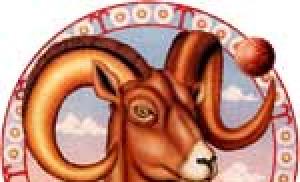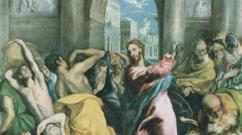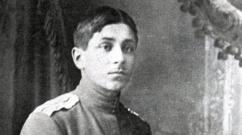Who was whose colony? Officer Igor Korotchenko Appointed to the Ministry of Defense.
Who led Soviet Ukraine?
These data debunk speculation that someone who came from outside carried out the seizure of food here, which led to the famine of 1932-1933. This is a simple statistical statement, a set of, so to speak, large numbers. Ukrainians made up an extremely high percentage of the leadership of the Ukrainian SSR, in some nominations - 100%.
Moreover, the huge number of Ukrainians who came to the highest echelons of the USSR allows us to think about who led the USSR in the first place. More than 30 years of Georgians Dzhugashvili and the same number of Ukrainians Khrushchev (in the picture in a traditional Ukrainian embroidered shirt), Brezhnev, Chernenko. And where is the Russian genocide? Who led whom? And the anti-Semitic theses of some Ukrainian nationalists turn out to be especially funny, given the share of Jews in the leadership of Ukraine. Is this a form of perversion, to genocide and humiliate ourselves, portraying ourselves as eternally humiliated? Svidomo inferiority complex?
So.
First Secretaries of the Communist Party of Ukraine Georgy Pyatakov. Cherkasy region, Kiev province (Ukraine), July-September 1918, March-May 1919, Ukrainian
Serafima Gopner. Kherson province (Ukraine), September-October 1918 (acting), Jewish
Emmanuel Quiring. Samara province (Russia), October 1918 - March 1919, German or German Jew
Stanislav Kosior. Siedlce Province (Poland), May 1919-November 1920, Pole or Polish Jew
Vyacheslav Scriabin (Molotov), Vyatka province (Russia), November 1920 - March 1921, Russian
Felix Cohn. Warsaw (Poland), March - December 1921 (responsible secretary), Jew
Dmitry Manuilsky, Volyn (Ukraine), December 1921 - April 1923, Jew
Emmanuel Quiring. Samara province (Russia), April 1923 - April 1925, German or German Jew
Lazar Kaganovich. Kyiv province (Ukraine), April 1925 - July 1928, Jew
Stanislav Kosior. Siedlce Province (Poland), July 1928 - January 1938, Pole or Polish Jew
Nikita Khrushchev. Kursk Province (Russia), January 1938 - March 1947, Ukrainian
Lazar Kaganovich Kyiv province (Ukraine), March-December 1947, Jew
Nikita Khrushchev, Kursk Province (Russia), December 1947 - December 1949, Ukrainian
Leonid Melnikov. Chernigov province (Ukraine), December 1949 - June 1953, Ukrainian
Alexey Kirichenko. Kherson province (Ukraine), June 1953 - December 1957, Ukrainian
Nikolai Podgorny. Poltava province (Ukraine), December 1957 - July 1963, Ukrainian
Peter Shelest. Kharkov province (Ukraine), 1963 - May 1972, Ukrainian
Vladimir Shcherbitsky. Ekaterinoslav province (Ukraine), May 1972 - September 1989, Ukrainian
Vladimir Ivashko. Poltava (Ukraine), September 1989 - June 23, 1990, Ukrainian
Stanislav Gurenko. Donetsk region (Ukraine), June 23, 1990 - September 1991, Ukrainian
Thus, in a republic where at least a third, or even half of the population is Russian, especially in industrial cities, the first secretaries of the Communist Party of Ukraine were persons of purely rural local origin or Jews (local or Polish).
Five cases partially fall out of the trend.
rosticus comments on them as follows: “Something tells me that it is very, very difficult to consider Emmanuel Quiring “Russian”. As for Khrushchev or Gurenko, only the figure of Gurenko can be controversial, although the surname is Ukrainian (which in itself is significant). Khrushchev, both by name and in essence (a native of the village of Kalinovka, on the border with Ukraine), is Ukrainian. Melnikov is also from the villages of the Chernihiv region, and formally he is still Ukrainian. If he is considered Russian, then the majority of the population of the Chernihiv region must be considered Russian.
Molotov (née Scriabin) is the only Russian in history on this, the most important Ukrainian SSR post, a working man from the Russian outback. He was appointed People's Commissar for Foreign Affairs and signed an act with Ribbentrop (under which, by the way, Ukraine received the eastern part of Poland).
Second Secretaries of the Central Committee of the Communist Party (b)/CP of Ukraine:
Dmitry Zakharovich Lebed (November 1920 - May 1924) Ukrainian (Ekaterinoslav province)
Alexey Vasilyevich Medvedev (May 1924 - January 1925) Russian (Kaluga province)
Ivan Evdokimovich Klimenko (January 1925 - October 1927) Ukrainian (Ekaterinoslav province)
Alexey Vasilyevich Medvedev (November 1927 - November 1929) Russian (Kaluga province)
Lavrentiy Iosifovich Kartvelishvili (November 1929 - December 1930) Georgian (Georgia)
Vasily Andreevich Stroganov (December 1930 - November 1932) Russian (Tomsk province)
Mendel Markovich Khataevich (November 1932 - January 1933) Jew (Gomel)
Pavel Petrovich Postyshev (January 1933 - March 1937) Russian (Vyatka province)
Mendel Markovich Khataevich (March - August 1937) Jew (Gomel)
Sergei Aleksandrovich Kudryavtsev (September 1937 - January 1938) Russian (Tver province)
Mikhail Alekseevich Burmistenko (January 1938 - September 1941) German (Saratov province)
1941 - 1946 - position vacant
Demyan Sergeevich Korotchenko (July 1946 - March 1947) Ukrainian (Chernigov province)
Leonid Georgievich Melnikov (December 1947 - December 1949) Ukrainian (Chernigov province)
Alexey Illarionovich Kirichenko (December 1949 - June 1953) Ukrainian (Kherson province)
Nikolai Viktorovich Podgorny (August 1953 - December 1957) Ukrainian (Poltava province)
Leonty Ivanovich Naydek (December 1957 - February 1960) Jew (Ekaterinoslav province)
Ivan Pavlovich Kazanets (February 1960 - July 1963) Ukrainian (Ekaterinoslav province)
Nikolai Aleksandrovich Sobol (July 1963 - March 1966) Ukrainian
Alexander Pavlovich Lyashko (March 1966 - June 1969) Ukrainian (Ekaterinoslav province)
Ivan Kondratievich Lutak (June 1969 - January 1976) Ukrainian (Kiev province)
Ivan Zakharovich Sokolov (February 1976 - October 1982) Russian
Alexey Antonovich Titarenko (October 1982 - December 1988) Ukrainian
Vladimir Antonovich Ivashko (December 1988 - September 1989) Ukrainian
Stanislav Ivanovich Gurenko (October 1989 - June 1990) Ukrainian
Leonid Makarovich Kravchuk (June - September 1990) Ukrainian (Rivne region, former Poland)
Grigory Petrovich Kharchenko (September 1990 - August 1991) Ukrainian
In total, before the war there were only 4 Russians: Medvedev, Stroganov, Postyshev, Kudryavtsev. All four were shot.
“Ordinary performers, but Ukrainian nationalist propaganda turns them into almost people who bear the main responsibility for all the “horrors of Bolshevism” in Ukraine. They are especially trying to make Postyshev a scapegoat and almost the main culprit of the “genocide of the Ukrainian people.” However, Postyshev was appointed to the position in January 1933 and executed in 1939, and before him and after him Mendel Markovich Khataevich held this position.
Secretaries of the Central Committee of the Communist Party of Ukraine for ideology (“third”):
A.P. Lyubchenko, November 1927 - 1934, Ukrainian
N.N. Popov, 1934 - June 1937, Russian
I.D. Nazarenko, October 1952 - June 1956, Ukrainian
S.V. Chervonenko, June 1956 - October 1959, Ukrainian
HELL. Skaba, 1959 - 1968, Ukrainian
F.D. Ovcharenko, 1968 - October 1972, Ukrainian
Valentin Malanchuk, October 1972 - April 1979, Ukrainian
A.S. Kapto, 1979 - 1986, Ukrainian
Vladimir Ivashko, 1986 - April 1987, Ukrainian
Y. Elchenko, 1987 - 1989, Ukrainian
Leonid Kravchuk, October 1989 - 1990, Ukrainian
Here is an extremely indicative list Chairmen of the Council of Ministers of the Ukrainian SSR (in current terminology - Prime Ministers)
1920-1923 Rakovsky Christian Georgievich Rumelia (Ottoman Empire) Bulgarian
1923-1934 Chubar Vlas Yakovlevich Ekaterinoslav province (Ukraine) Ukrainian
1934-1934 Lyubchenko Panas Petrovich Kyiv province (Ukraine) Ukrainian
1937-1937 Bondarenko Mikhail Ilyich Kherson province (Ukraine) Ukrainian
1937-1938 Marchak, Nikolai Makarovich Podolsk province (Ukraine) Ukrainian
1938-1939 Korotchenko Demyan Sergeevich Chernigov province (Ukraine) Ukrainian
1939-1944 Korniyets Leonid Romanovich Kherson province (Ukraine) Ukrainian
1944-1947 Khrushchev Nikita Sergeevich Kursk province (Russia) Ukrainian
1947-1954 Korotchenko Demyan Sergeevich Chernigov province (Ukraine) Ukrainian
1954-1961 Kalchenko Nikifor Timofeevich Poltava province (Ukraine) Ukrainian
1961-1963 Shcherbitsky Vladimir Vasilievich Ekaterinoslav province (Ukraine)
Ukrainian
1963-1965 Kazanets Ivan Pavlovich Ekaterinoslav province (Ukraine) Ukrainian
1965-1972 Shcherbitsky Vladimir Vasilievich Ekaterinoslav province (Ukraine) Ukrainian
1972-1987 Lyashko Alexander Pavlovich Ekaterinoslav province (Ukraine) Ukrainian
1987-1990 Masol Vitaly Andreevich Chernigov province (Ukraine) Ukrainian
1990-1991 Fokin Vitold Pavlovich Zaporozhye region (Ukraine) Ukrainian
As you can see, there is not a single Russian on the list, not even a native of Ukraine! All entirely Ukrainian peasants (the first generation proletariat).
Deputy heads of the Council of Ministers of the Ukrainian SSR (or, as they say today, deputy prime ministers):
1952-1954 Kalchenko Nikifor Timofeevich Ukrainian
1961-1978 Tronko Pyotr Timofeevich Ukrainian
1961-1976 Kalchenko Nikifor Timofeevich Ukrainian
1962-1966 Grushetsky Ivan Samoilovich Ukrainian
1966-1972 Sobol Nikolay Aleksandrovich Ukrainian
1967-1981 Semichastny Vladimir Efimovich Ukrainian
1972-1983 Vashchenko Grigory Ivanovich Ukrainian
1978—1990 Orlik Maria Andreevna Ukrainian
1979-1987 Masol Vitaly Andreevich Ukrainian
1980-1987 Gurenko Stanislav Ivanovich Ukrainian
1986-1989 Dzys Georgy Ukrainian
1989-1990 Masik Konstantin Ivanovich Ukrainian
Chairmen of the Central Election Commission and the Supreme Council:
1938-1939 — Korniyets Leonid Romanovich Ukrainian
1939—1954 — Grechukha Mikhail Sergeevich Ukrainian
1954-1954 — Korotchenko Demyan Sergeevich Ukrainian
1969—1972 — Lyashko Alexander Pavlovich Ukrainian
1972—1976 — Grushetsky Ivan Samoilovich Ukrainian
1976—1964 — Vatchenko Alexey Fedoseevich Ukrainian
1984—1990 — Shevchenko Valentina Semenovna Ukrainian
1990-1990 — Ivashko Vladimir Antonovich Ukrainian
1990-1991 — Kravchuk Leonid Makarovich Ukrainian
Chairmen of the KGB of Ukraine
1954—1970 — Nikitchenko Vitaly Fedotovich Ukrainian
1970—1982 — Fedorchuk Vitaly Vasilievich Ukrainian
1982—1987 — Mukha Stepan Nesterovich Ukrainian
1987—1991 — Golushko Nikolai Mikhailovich Ukrainian
Heads of the Ministry of Internal Affairs of Ukraine
1946—1956 — Strokach Timofey Amvrosievich Ukrainian
1982—1991 — Gladush Ivan Dmitrievich Ukrainian
1962—1982 — Golovchenko Ivan Kharitonovich Ukrainian
All are entirely Ukrainian villagers.
This is how these studies conclude in a revealing way, debunking the myth of “Russian occupation” and “Moscow imperialism” with biographical facts.
At the same time, in the leadership of the USSR itself the picture is completely different.
Suffice it to recall Khrushchev and Brezhnev, who also wrote in their autobiographies - a Ukrainian. Certainly no one forced him.
Original here: http://www.voskres.ru/bratstvo/kojuscko.htm Andrey Kozhushko
Instead of indiscriminate criticism, I recommend reading the Associate Professor’s polemic with Rosticus, part of which I quote: “Pyatakov is Russian and not Ukrainian
Quiring is a German without any?
Kosior - similarly - a Pole without any problems?
Kon is a Pole and not a Jew
Manuilsky is Ukrainian and not a Jew
Khrushchev is rather Russian, because he is from the industrial Donbass.
Melnikov is Russian, but he really disliked Ukrainians
Burmistenko is not a German (this is pure nonsense) but a Ukrainian
Korotchenko - similarly - is not a Jew (at least agree with yourself on this nonsense, otherwise there are two different nations on the two lists), but a Ukrainian. Even if we accept all criticism unconditionally, the overall picture will not change. You can argue as much as you like. that Khrushchev was Russian, but lost his temper in Ukrainian, came from a Ukrainian village in the Kursk region, wore embroidered shirts and called himself Ukrainians, simply masquerading as a nation, belonging to which under Stalin was mortally dangerous. But with this it is better to go straight to a psychiatrist. "Excavations have been completed
Igor Korotchenko has two biographies. One is official – crystal clear. but the second one forces you to sue, especially on those points that are already difficult to prove today.
Igor Korotchenko gave 12 years of his life to the army. He served in an Air Force repair shop and ensured communications security at the General Staff. There were not enough stars from the sky - apparently, the stars on his shoulder straps were more important to him. A sharp turn in the life of Lieutenant Colonel Korotchenko happened in 1994.
The officer was dismissed from the army under the discreditable 49th Article of the Federal Law “On Military Duty and military service“as a military serviceman who has ceased to “meet the requirements established for him by law.” At the mere reminder of this fact, Korotchenko begins to go into real hysterics, which the whole country witnessed during the debates before the 2016 State Duma elections (he lost to Gennady Onishchenko). Oleg Mitvol deceived his opponent - Korotchenko began yelling at the leader of the “Greens”, called him a “traitor to the Motherland” and threatened to send him “to NATO machine guns.”
Why was the officer shown the door? According to his opponents, he screwed up: he cheated with the rations of his colleagues, wrote denunciations, for which he was allegedly beaten several times. However, the newspaper “Military Industrial Courier” (from which Korotchenko was also expelled with scandal, but more on that below) was unable to prove this information in court. If there were any bruises, they had healed long ago, so I had to give
refutation.
Kicked out of the newspaper
In the same 1994, Korotchenko got a job at Nezavisimaya Gazeta. They say that the newly minted military correspondent found an approach to the then owner of the media, Boris Berezovsky, and, taking advantage of his proximity to the body, weaved intrigues against the editor-in-chief. Korotchenko is also accused of writing custom articles (supposedly this is where the nickname Mister Thousand Dollars came from), but this is all, again, behind-the-scenes talk. Was it or not? Vitaly Tretyakov knows this for sure. But the former head of Nezavisimaya, as soon as he heard from us the name of the ex-employee, he flatly refused to talk about him.
After NG, Korotchenko got a job at the weekly Military-Industrial Courier, where he was busy praising Defense Minister Sergei Ivanov, whom many saw as Vladimir Putin’s successor. Then, with a bang, he flew out of the ranks Russian army officer... suddenly received the rank of colonel! Moreover, in violation of the procedure: Korotchenko did not go through the required military training in this case. When the illegality of obtaining the title was discovered, a new law had already been adopted, which allowed promotion on the basis of one certification. Korotchenko came out of this story with minimal losses (only the date of the order changed), but the sediment remained.
And then another problem came. Korotchenko, who by that time had become the editor-in-chief of VPK, disagreed with the owner of the newspaper, Igor Ashurbeyli. In such cases, someone leaves on their own, someone butts heads, and the colonel simply began to... truant. It was under this article that he was fired. Even the court, where Korotchenko, as usual, turned, did not help him.
Appointed to the Ministry of Defense
In 2012, a man with a tarnished military past received a new position: chairman of the Public Council of the Ministry of Defense (instead of Nikita Mikhalkov, who was disgraced with a flashing light). This happened when the ministry was still headed by Anatoly Serdyukov, whose reforms, like Ivanov’s in his time, were sung by Igor Yuryevich. Korotchenko found himself not only in a new position, but also in charge of the budget. Under him, 150 million rubles allocated for the formation of a positive image of the military department disappeared without a trace. The ex-head of the OS (currently in this position is Pavel Gusev) managed to dispute the accusations of misuse of funds. But where the money went is unknown.
They feed on government orders
Korotchenko is like a modern Khlestakov. You yourself already understood what type of warrior he is. It would be hard to call him a journalist either. Military expert? Korotchenko’s colleagues laugh at his “competence” and recall the story of how he, who graduated from the Tambov School, when he headed the Public Council, also indicated in his biography a diploma from the Military Academy. Frunze. Journalists made an inquiry: it turned out that Igor Korotchenko never studied there.
All this does not prevent the screen star from being a successful businessman. Korotchenko lives well on millions of government orders.
– I assume that this gentleman is financed by the military-industrial complex. Perhaps Deputy Prime Minister Rogozin, admits Andrei Karaulov, who dedicated a separate issue of “The Moment of Truth” to Korotchenko.
According to another version, Korotchenko enjoys the patronage of Sergei Ivanov, with whom he has maintained relations since the time of the joint but unsuccessful campaign against the Kremlin.
Who is he, Mr. Korotchenko? Disabled person. Yes, yes, disabled. So says Oleg Mitvol. Until they let them in on the machine guns, he recalls:
– Before that very debate, when Korotchenko snapped at me, I was standing at the Mosfilm pavilion. I was thinking through my speech about how to help people living in Russia with disabilities(that was the topic). At that moment, a car with a yellow disabled person’s badge drove up to the entrance, and a huge man solemnly emerged from the back seat. It reminded me of Operation Y. “Don't make noise! I'm disabled! - says Morgunov. And then he easily lifts the car, turning it around. So, that “disabled person” at Mosfilm was Igor Korotchenko.
Musical magazine "Songs of War and Victory". Presenter 1: Many years separate us from the harsh, menacing days of war. But time will never erase the Great Patriotic War from the memory of the people. Songs created in those harsh years helped our people to live, work, fight, and defeat the enemy at the front and in the rear. “When the guns speak, the muses are silent,” says the saying. But the poetry of the warring people refuted it. From the first days of the war, dozens of songs appeared that immediately went to the front. The songs spread quickly, passed from mouth to mouth, flew across the front line, and penetrated into partisan detachments. Reader 1: And the words of honest songs called to fight for the Fatherland to the end. And from the songs the tears froze like drops of deadly lead. Presenter 2: “Holy War” - this song was born and sounded in the first days of the war. The poems that became its text were written by the famous songwriter Vasily Lebedev-Kumach. The first composer to write music for it was Alexander Alexandrov. The song was published simultaneously in the newspapers Izvestia and Krasnaya Zvezda on June 24, 1941. (presentation “1941”) Presenter 1 The very next day, according to the notes written on the slate board, the Red Banner Song and Dance Ensemble rehearsed it. From that day on, the song has come a long and glorious way. Every morning after the striking of the Kremlin chimes, “Holy War” sounded on the radio. It became a symbol of the Great Patriotic War. Our fellow villagers went under it in the first days of the war: Anashkin Nikolai Dmitrievich, Belokopytov Vasily Vasilyevich, Levchenko Stepan Korneevich, Oskolkov Mikhail Egorovich, Andreev Pyotr Nikiforovich. (the song “Holy War” is playing, presentation of veterans) Reader 2 It’s you, the people’s avengers, Dashing , Komsomol detachment Above you there are sensitive leaves At your feet the trees are rustling... Presenter 2: In the song chronicle of the Second World War, songs about partisans make up a special chapter. In the fall of 1942, the headquarters of the Bryansk Front received an unusual radiogram from the partisans of the Bryansk forests with a request to send a song. This order was fulfilled by the composer S. Katz and the poet A. 1 Safronov. The authors wrote the partisan song “The harshly noisy Bryansk forest.” It became the main song of 1942, it was sung when leaving for the front: Dmitry Viktorovich Galaktionov, Alexander Gavrilovich Dorogin, Daria Alexandrovna Egoshina, Roman Stepanovich Popov, Dmitry Vasilievich Tolstenko, Timofey Spiridonovich Vasiliev, Kurbatov Nikolai Fedorovich The choir performs the song “The harshly noisy Bryansk forest.” (Presentation of veterans) Presenter 2: Songs of the war years are a musical chronicle of the war. They reflected many pages, heroic and tragic, funny and sad. In 1943, for the film “Two Fighters”, the composer Bogoslovsky, based on the words of the poet Agatov, wrote the song “Dark Night”. After Mark Bernes sang "Dark Night", it received universal recognition. ... Presenter 1 Passed from mouth to mouth, the song spread at lightning speed at the front. Lyrical, a little sad and very sincere, everyone liked the song, including our fellow villagers who went to the front in 1943: Pavel Alekseevich Baukov, Timofey Petrovich Genov, Semyon Yakovlevich Gartsev, Nikolai Aleksandrovich Kroponin, Ivan Fedorovich Kurbatov, Alexander Mikhailovich Galaktionov, (dramatization of the song) Reader 1 When they go to death, they sing, And before that you can cry, After all, the most terrible hour in battle is the hour of waiting for an attack. Presenter 2: (presentation of military concerts) Front-line concerts of 1944 certainly included funny poems, ditties and, of course, songs. The most common songs were “On a Sunny Meadow” and “Smuglyanka”. “Darkie” was part of a suite written by composer Novikov and poet Shvedov in 1940, commissioned by the ensemble of the Kyiv Special Military District. Presenter 1: However, in the pre-war years the song was never performed. At the beginning of the war, the composer decided to show “Darkie” on the radio. But there she was rejected. And they began to perform it only in 1943. Semyon Sidorovich Anisimov went to fight under her. (choir sings, dances) Reader 2: The light of the coming victory was already visible. Soviet Army liberated the peoples of Europe. It was at this time that the song “Roads” was born. (presentation 1945) Reader 1 2 The authors of the song, composer Novikov and poet Oshanin, created a poetic image of a mother who had been waiting for years for her son, who walked the soldier’s roads to Victory. Presenter 2: The marshal accurately explained the huge success of the song Soviet Union G.K. Zhukov, who called the song “Roads” an immortal song. This immortal song is carried along the roads of war by Nikolai Kharitonovich Korotchenko and Sergei Ilyich Myakushin. Song “Roads” (choir) Presenter 1: The Great Patriotic War is going further and deeper into history and songs written during the days of battles are heard less and less often. But new songs about war are appearing, the main idea of which is the responsibility of today's generation for the future. One of these songs is “Victory Day,” written by composer D. Tukhmanov and poet V. Kharitonov. And may the great songs of the Victory Day be Patriotic War sound with renewed vigor. Song “Victory Day” (recording) (slide veterans) 3
Daily Journal: Mediaphrenia. Mockery
“The murder of Boris Nemtsov largely clarified the situation in the country and, in addition, allowed many public figures to draw their self-portraits and take selfies against the backdrop of the tragedy. Gavriil Popov, one of the idols of perestroika and leaders of democratic transformations in Russia, published a column in Moskovsky Komsomolets under the heading “Six cartridges for GDP.” That is, the author believes that when shooting at Nemtsov, the killer was aiming at Putin.
“The only answer to Nemtsov’s murder,” says the former reformer, “may be to rally around the president.” It turns out that “Putin is now in the minority” and the main thing that is happening in Russia is “a desperate struggle for the president.” Sincere sympathy for Putin emerges behind the restrained lines of the article by G.Kh. Popova. And the author can be understood: well, you can’t sympathize with Nemtsov in this situation,
after all, they actually shot not at him, but, as the author found out, at Putin.
There are only enemies around Putin: Western liberals are pulling back to the 90s, the “war party”, “hawks”, which in addition to the military also includes journalists, are thirsty for blood. But the most dangerous are the “careerists” who “see prospects for their advancement only in the event of an escalation of the situation, even war.” Gavriil Kharitonovich knows: “There can be only one answer: it is necessary to create a movement in defense of Putin.”
To understand the genius of the dialectical thinking of the former mayor of the capital, we must remember that this was his response to the murder of Boris Nemtsov. In response to the murder of Nemtsov, Putin’s most implacable critic and personal enemy, a movement must be created in defense of Putin. Why are you surprised? This is dialectics, unity and struggle of opposites. The fight ended due to the murder of one of the opponents, now let's organize unity in favor of his opponent on his corpse.
There is, however, a small problem here. By creating a movement in support of Putin, Gavriil Kharitonovich will be forced to stand at the tail of a long line from United Russia, the All-Russian Popular Front and the mass of Cossack, military-patriotic and other organizations. Anti-Maidan was the last to stand up and asked not to occupy behind it. So the chances of G.H. Popov’s way to get to the body of the GDP to organize the protection of this body should be considered illusory. But the intention may be taken into account, and then G.Kh. Popov will be able to convert it into any benefits.
Some reformers and former colleagues and friends of Nemtsov, while bidding farewell to him, spoke words that were clearly addressed not to the deceased, who would not hear anyway, but to someone who was very much alive and very influential. For example, Anatoly Chubais, answering a question from a Vesti employee, calls: “We all need to stop. I emphasize - everyone. Authorities, opposition, liberals, communists, nationalists, conservatives - everyone. It’s time to stop and think for a minute about where we will lead Russia.”
Wise advice. Especially in relation to the opposition and liberals. Especially over the body of a murdered friend, Boris Nemtsov. Which has already stopped, or rather, he was stopped. Anatoly Borisovich cannot help but know that although in a biological sense the state of the still living opposition leaders is significantly different from the state of Boris Nemtsov, in a political sense the differences are much less significant. In other words, life in the opposition, especially in its liberal part, is barely glimmering. There are stop lists on TV, Churov in the elections, riot police on the streets, and then there is the court, Basmanny or Tverskoy, where the sentences are carbon copies. Chubais, undoubtedly a smart man, understands perfectly well that a call for the opposition to “stop” is tantamount to a call to disappear. Anatoly Borisovich, your friend Nemtsov has “stopped” at the moment. Has it become easier for you? Let's conduct a thought experiment: the entire opposition and all liberals, following Nemtsov, “stopped” at your call. Now they will take Russia where it needs to go?
Cui prodest?
The Roman lawyer Cassian Longinus Ravilla, who died two thousand years ago, today has become the leader in citations in Russia, since all participants in numerous talk shows on Russian television and authors of publications in the press began their speeches with his aphorism “Look for those who benefit.”
The search for those “who benefit” was carried out by almost all the guests of all “Evenings with Vladimir Solovyov”, which, since the murder of Boris Nemtsov, went virtually non-stop all last weekend.
The most popular version was that Nemtsov was killed by his ideological supporters. Director Karen Shakhnazarov explained that Nemtsov’s murder was not beneficial to anyone in Russia, but it was beneficial to “the neighbor where the war is going on” and the West, which wants to disrupt the Minsk agreements.
Inviting on air to discuss the murder of Nemtsov those people who, of course, were involved in this murder because they flooded the country with hatred directed against the opposition and liberals, and thereby legitimized violence against them—inviting this pack was a mockery of the memory of the murdered man . But the presence of some characters on such programs went beyond even Solovyov’s standards.
Here, for example, Zh. Quite cheerful and absolutely alive, grimacing and playing the fool, talks about Nemtsov’s death. “The trail is clearly traced from the West. Starovoitova, Yushenkov, Politkovskaya - I see a Western trace,” Zh. prophesies, and then his signature buffoonery begins: “There is a girl from Ukraine, I am sure that she is connected with the SBU. Why didn’t he (Nemtsov) date a girl from Siberia?”
Demonstrating unity in the fact that the death of Nemtsov is unprofitable for the Russian authorities (a copy of Putin’s old remark that Politkovskaya did more harm with her death than with her publications), the experts of Solovyov’s “Evenings” somewhat disagreed on who was the beneficiary and the orderer of the murder .
The majority confidently pointed towards the West. In addition to director Shakhnazarov, politicians Zyuganov and Mironov, Rutskoi and Seleznev, experts Korotchenko and Linter think so.
The Ukrainian trail was discovered by political scientist Mikheev and member of the RF OP Grigoriev, who was haunted by Boris Nemtsov’s companion, and he repeated several times: “She flew in from Kyiv. She flew in from Kyiv.” And every time these words, spoken by a member of the RF OP Grigoriev, sounded like irrefutable evidence of the girl’s involvement in the murder of Nemtsov: well, a person who flew in from Kyiv cannot be innocent, they don’t just fly from there!
The most exotic version was presented to TV viewers by Evgeny Satanovsky and Vladimir Solovyov himself. They practically proved right in the studio that those who ordered Nemtsov’s murder were Mikhail Khodorkovsky and Leonid Nevzlin. Follow the logic of Solovyov-Satanovsky.
First, Soloviev said that he once went to London to see Boris Berezovsky and he shared with him his cherished plans for presidential elections 2004. So, Berezovsky told Solovyov, and he shared with the audience of “Russia 1” that Boris Abramovich was going to “choose a sacred victim” during the elections in order to disrupt these elections. And this victim, according to Solovyov, should have been Ivan Rybkin. Since there were no witnesses to Berezovsky's revelations, except Solovyov himself, we are obliged to take Vladimir Rudolfich at his word. And why not believe to a good person, which 84% of our compatriots believe?
Here Soloviev gave the floor to the most sacred victim, that is, I.P. Rybkin, who immediately, as usual, said something so vague about some “trillions of dollars taken out of Russia” that Solovyov was forced to interrupt him and ask the question point blank: “Are you talking in a veiled way about a person named Nevzlin?”
Rybkin never said the surname “Nevzlin”, but again he said something so veiled that Solovyov interrupted him again, especially since Rybkin had already fulfilled his role as a “witness”. After which the floor was given to Evgeny Satanovsky, who presented new evidence that the murder of Nemtsov was the work of either Khodorkovsky or Nevzlin, or they killed together.
“Every killer has a customer,” Satanovsky impressed with his knowledge of the criminal behind the scenes. And he further clarified: “If this was in the 90s, it would be Berezovsky. Today - Khodorkovsky. This is the handwriting of the YUKOS team.” Unfortunately, Evgeniy Yanovich did not explain what exactly the signature killer style of the YUKOS team is. Does this team always have the habit of killing a stone's throw from the Kremlin, in an area full of FSO, video cameras and police? And if so, when was the last time the YUKOS team committed the murder of a like-minded liberal near the walls of the residence of the President of the Russian Federation?
Without in any way wishing to darken the memory of the Roman lawyer, who two thousand years ago formulated the principle “Look for those who benefit,” I will nevertheless note some non-universality of this method. I will say more: very often it leads to the wrong trail.
Who was the beneficiary of the assassination of Alexander II? Objectively, the “right party”, the conservatives, who after the murder were able to curtail the reforms they hated and gain full power. Does this mean that we should look for a connection between the Narodnaya Volya members Grinevitsky, Zhelyabov and Perovskaya on the one hand and Konstantin Pobedonostsev and Konstantin Leontyev on the other? Or maybe we could work out a version of the involvement in the regicide of the one who took the imperial throne, that is, Alexander the Third? Absurd? Yes, sure. But hardly more than attempts to look for a Western, Ukrainian or Yukos trace in the murder of Nemtsov, guided solely by the principle of cuiprodest.
The beneficiaries of the Second World War were objectively the United States, which after its end became the No. 1 superpower, and the USSR, or rather, Stalin personally, who gained control, to one degree or another, of a quarter of planet Earth, including half of Europe. Is it possible, in accordance with the logic of “who benefits,” to consider Hitler an agent of the United States or a hireling of Stalin?
The method of searching for those “who benefit” would be universal if society were structured like a clockwork mechanism, and people had calculators instead of brains. In fact, in our life there is what Hegel called “the irony of history” or “the cunning of reason,” when the consequences of the actions of people and nations turn out to be outside the logic of their plans, and even contradict these plans.
Good Nemtsov is dead Nemtsov
The murder of Nemtsov - both due to the scale of the personality of the murdered man and due to the circumstances of the place and time - became such a resonant event that Russian propaganda was forced to somehow adapt so that the coverage of this event did not look too stupid.
Adaptation went in two directions. Firstly, in order not to look like complete cannibals, Russian TV channels suddenly discovered that Nemtsov, it turns out, was a great guy and even a good politician. This became clear suddenly, and immediately after the death of Boris Efimovich, and before that he was exclusively an enemy of the people and a fifth column. But after his death, it turned out that his friends were almost all the inhabitants of television broadcasts, including Vladimir Solovyov, Alexander Rutsky, Alexander Khinshtein, Ivan Rybkin, Gennady Seleznev and other characters who, with their calls to persecute the opposition, created a favorable atmosphere for the murder.
The second direction was represented much more widely. “Nemtsov is a political zero who did not pose any threat to the authorities.” Almost a third of the two-hour program “News of the Week” by Dmitry Kiselev was devoted to the substantiation of this thesis. Levada Center ratings are cited as proof: 86% is Putin’s rating, and “Nemtsov is not being probed,” as Kiselyov wittily joked.
The fact that sociology, in conditions of total propaganda in the absence of independent media, is capable of best case scenario to show the effectiveness of this propaganda, and even then with large adjustments for the unknown coefficient of fear and mistrust of people towards a person with a form in their hands - Kiselev’s propaganda prefers to ignore this obvious fact.
Russian propaganda, forced in the days between Nemtsov’s murder and his funeral, to talk about Boris Efimovich, did everything to somehow obscure the true scale of this man’s personality and global political weight in the eyes of the population.
Nemtsov’s international fame and the opportunity to communicate with heads of state, senators and parliamentarians of the world’s leading countries gave him a chance to influence world public opinion. And Nemtsov used this chance 100 percent. The “Nemtsov list,” which, as a continuation of the “Magnitsky list,” was presented by Nemtsov to the European Parliament, began with Putin’s last name. His reports “Putin. Corruption", "Putin. Results”, “Putin and the Winter Olympics in the subtropics” made Nemtsov Putin’s personal enemy No. 1. Nemtsov’s next report, which the politician was prevented from finishing by four killer bullets, was devoted to evidence of the presence of Russian troops in Ukraine. This report could become the basis for the upcoming tribunal in The Hague, the inevitability of which for Vladimir Putin Boris Nemtsov has repeatedly predicted.
Boris Nemtsov was the number one figure in the Russian opposition. This was not obvious during his lifetime, but became clear after his death. Russian propaganda did everything to slander Nemtsov during his lifetime, created all the prerequisites for his murder and, undoubtedly, will do everything to quickly forget him. But this largely depends on us. Nemtsov’s friend, Boris Nadezhdin, suggested, for example, that the bridge on which he was killed should be named after Nemtsov. It doesn’t matter whether the authorities agree to this or not. You can call it that among yourself, just as in Soviet times many people called Leningrad St. Petersburg."













